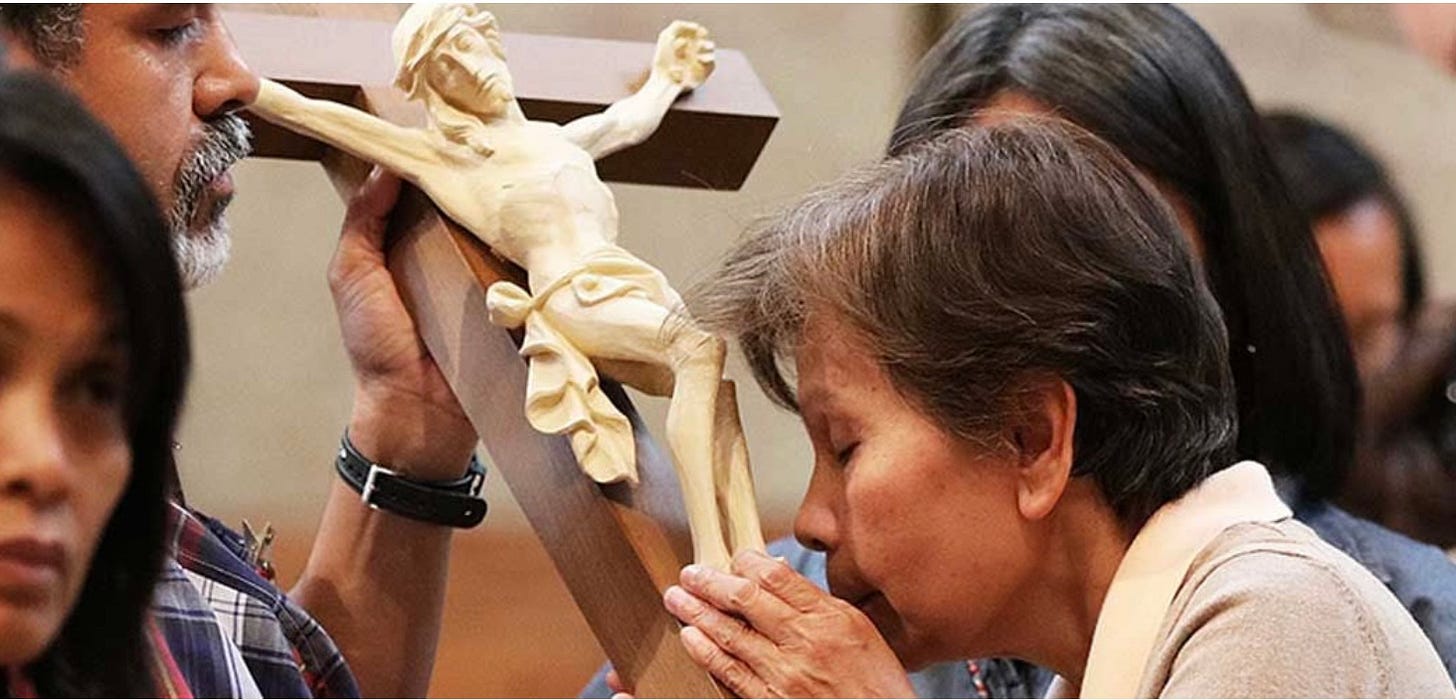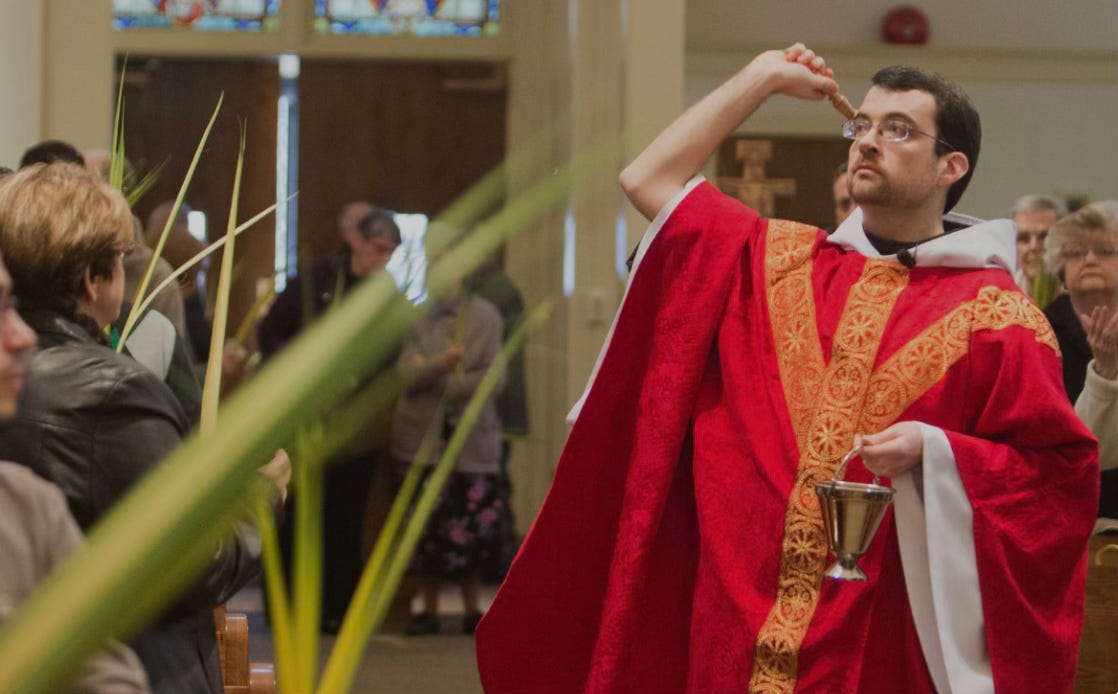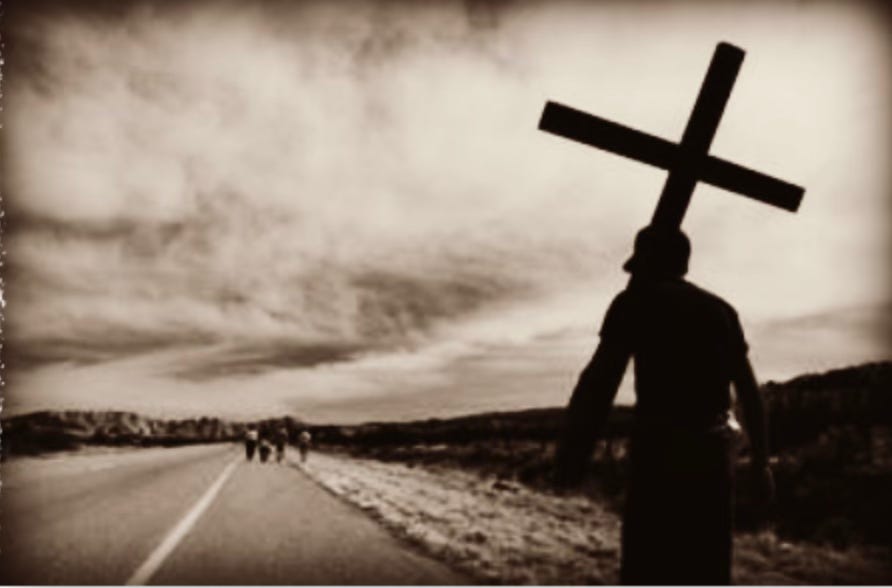This year I am going to have a different focus to Holy Week as the climax of the liturgical year. This week is a deep plunge into the mystery of love that suffers—not as appeasement to an angry God, but as the very revelation of God who suffers with and for us to break the power of all that enslaves. Increasingly now to challenge the false and vengeful perspective of nationalist and popularist Christianity and its fundamentalism that has little to do with Jesus and the significance of this week before us.
Too often, Christians approach this week with a theology of redemptive violence at its core: that Jesus suffers to absorb the wrath of a furious divine Father, standing in as substitute, satisfying divine justice through divine punishment. This view, rooted in a penal substitutionary framework, distorts the Gospel (many of the desert mothers and fathers argue it is pagan and not Christian) and tragically turns the Cross into a transaction of vengeance rather than love. But what if there is another way to enter Holy Week—one that takes John’s Gospel seriously as a theological guide?
In John’s telling, Jesus is no passive victim. He is no scapegoat for divine fury. He is the incarnate Word, the Logos made flesh, who moves with purpose and clarity toward the Cross—not out of resignation, but as a revelation of the Love that refuses to be overcome.
“No one takes it from me, but I lay it down of my own accord.” (John 10:18)
John’s Jesus is not caught in a cosmic machinery of punishment. He is free. He is strong. He knows what he is doing. He carries his cross, not dragged by Roman power but carrying Roman power to its breaking point. His death is not to appease; it is to unmask. His suffering is not transactional; it is transformational. This week and that Cross is about unbounding the enslavement of all life and matter.
In John, the crucifixion is not framed as divine justice being satisfied. It is framed as divine love being poured out (kenosis). The Cross is not the instrument of God’s wrath— it is instead the place where the oppressive systems of religious legalism, political violence, and imperial dominance collapse under the weight of their own cruelty, exposed for what they are in the light of Jesus’ unwavering love.
“And I, when I am lifted up from the earth, will draw all people to myself.” (John 12:32)
Lifted up—not as condemned, but as glorified. In John’s strange and beautiful vision, the Cross is not the shameful end of Jesus, but the enthronement of the Servant-Messiah beginning the Kin-dom whose love reveals the true face of God.
This love is not abstract. It is fiercely present in real suffering. It is a love that walks into Jerusalem with eyes wide open. A love that kneels to wash feet. A love that does not retaliate. A love that gives itself away for the sake of healing a broken world.
When we reach Thursday, Maundy Thursday and Triduum — the great three days —we are invited not to weep for Jesus as though he were a powerless victim, nor to see ourselves as the cause of his suffering. We are not meant to wallow in guilt. We are meant to be converted by love.
We are meant to enter Holy Week not through fear, but through awe. To let go of the idea that sin is primarily a legal problem to be punished, and instead to see sin as the power that dehumanizes and divides—and Jesus as the one who breaks those chains.
In this light, the Cross becomes not a courtroom, but a battlefield of liberation. Not a divine exchange, but a cosmic exposure of evil and a triumph of divine fidelity.
John shows us a Jesus who does not cry out “My God, my God, why have you forsaken me?” as in the Synoptics—but instead, in his final breath, proclaims:
“It is finished.” (John 19:30)
Not “I am finished,” but it—the power of death, the machinery of fear, the illusion of separation from God. Finished. Done. Overcome.
And when the spear pierces his side, it is not merely blood that flows, but water—the sign of new creation, the birth of something utterly new. John echoes Genesis here. This is not the end of a failed Messiah. This is the beginning of new creation. This is Eden, reimagined through the tree of the Cross.
So how shall we enter Holy Week, if John is our guide?
We enter with courage—not to relive divine punishment, but to witness divine protest.
We enter to stand with the God who stands with all who suffer unjustly.
We enter to behold the Lamb of God, who does not take away God’s wrath, but takes away the sin of the world—not by violence, but by love.
We enter to let our hearts be broken open—not by guilt, but by compassion.
We enter to be set free—not just from personal sins, but from all powers that crush the vulnerable, silence the poor, and disfigure the image of God in humanity.
We enter into the heart of the mystery—that the love of God is most fully revealed in the willingness of Jesus to bear the full weight of injustice without becoming unjust himself.
So this Holy Week, let us enter it through stillness, through presence, through the contemplative path.
John’s Gospel is uniquely contemplative. It is the Gospel of abiding—of dwelling deeply in Christ, as Christ dwells in us.
“Abide in me, as I abide in you.” (John 15:4)
To walk with John through this Holy Week is to sit in silence before the mystery, not to explain it, but to let it explain us. It is to watch as Mary does, to stand as the Beloved Disciple does at the foot of the Cross—not with answers, but with an open heart.
In this contemplative entering, we resist the urge to rush to Easter. We stay with the tension. We make room for the tears. We descend into the depths, not to be swallowed by death, but to discover the God who descends with us.
This Holy Week, let prayer be less about words and more about listening.
Let the washing of feet be a practice of humility in our own lives.
Let the breaking of bread be an act of radical remembrance—not just of Jesus’ death, but of the divine self-giving that continues to nourish and sustain all things.
Let the silence of Holy Saturday be honoured—not as empty waiting, but as sacred space where love does its hidden work.
John shows us a God who is not far off, not demanding appeasement, but who is deeply present in flesh and suffering. A God who enters into the human story to its furthest edge. A God who is not afraid of our wounds, our grief, our failures. A God who meets us in our silence and leads us—not by force, but by love—into the still point where death is undone from the inside out.
To enter Holy Week contemplatively with John is to lay down our defenses and open to the love that is already there.
It is to say with Jesus:
“The hour has come.”
And to say with Mary:
“Here I am.”
And to say with the Beloved Disciple:
“I will stay with you.”
This week, stay with Jesus—not as hero, not as scapegoat, but as Lover and Liberator.
Let yourself be seen.
Let your heart be broken open—not to fall apart, but to be made whole.
And know this: the mystery of Holy Week is a path to be walked. Slowly. Quietly. Faithfully. In love.
Let us walk through this Holy Week not as ashamed sinners grovelling at the feet of an angry God, but as beloved disciples drawn into the mystery of a love that refuses to retaliate, refuses to abandon, refuses to give up—ever.
Let us follow Jesus through John’s eyes — the One who walks freely into suffering, not to appease, but to liberate.
Let us be changed again, once more…..
Top Photo by Marek Piwnicki on Unsplash








Let your heart be broken open—not to fall apart, but to be made whole.
I'll remember this as I walk through the world today ♥️
Thank you for this lovely reflection. There are many thoughts here to keep coming back to. Bookmarked and very much appreciated!